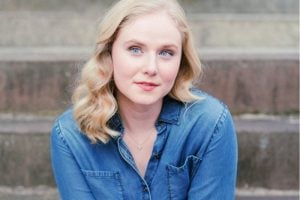
The following was written by Erica Avery, FastForward U’s communications intern. July is Disability Pride Month.
While many devices designed by biomedical engineers have passed through FastForward U’s doors to treat illnesses and physical disabilities, some founders are approaching supporting disability from a different angle — personal experience.
Rebecca Rosenberg founded ReBokeh, winner of the Spring 2022 Fuel Demo Day and the first student venture focused on providing accommodations for the sensory disability community, because she needed those accommodations herself.
ReBokeh increases accessibility for those with moderate visual impairment, including Rosenberg, who has a form of albinism. ReBokeh’s recently launched app creates customizable video filters specific to the user’s condition and needs to enhance their existing vision.
“It’s more than just being a technology for independence, it’s about being seen,” says Rosenberg, a graduate student in the Center for Biomedical Innovation and Design. “It’s about going so long through our lives feeling unseen. Having something out there that has been designed specifically for a community of people who have, to that point, really not had anything is the thing that gets me up in the morning.”
Zandy Wong, a rising junior in public health studies, was part of the student startup Cognitivae, which is developing an app that makes mental health therapy more accessible. Wong, who has hearing loss, since founded the NextGen Accessibility Initiative, a youth-led, digital accessibility advocacy volunteer organization that partners with Gen Z organizations to help them identify and fix accessibility errors in their educational content. Her work has been recognized by the Clinton Foundation and has helped over 200,000 youth across 119 countries have accessible educational content.
“The biggest strength that comes with being an entrepreneur with a disability is that we’re expert advocates and understand how to communicate and compromise with people to keep advancing our ventures forward because we’ve been advocating our entire lives to just fit into environments,” Wong says. “Many disabled entrepreneurs I’ve met are also addressing issues that hit close to home for them, so it is often a form of giving back.”
The goal of both women is to promote independence and dignity among the disabled by helping educate and empower their communities to realize they have the power to make the world more accessible. Rosenberg and Wong embody a common expression in the disability community: “Nothing about us, without us.”
“We’re not trying to fix anybody’s impairment. What we’re trying to do is give them the tools they need to succeed in a different way,” Rosenberg says. “For those of us in this moderate impairment range, we have decent functional vision, and we want the dignity of being able to use it. …I have always truly felt like the best thing we can possibly do for the disability community is make sure that they know how to help themselves.”
Josh Ambrose, director of student ventures at FastForward U, said the accelerator program is proud to work alongside and learn from founders in the disability community.
“We celebrate that more and more awareness is coming to the incredibly valuable work from founders who face a range of challenges and develop creative solutions that make the world a better place,” he says. “Their ingenuity and ethic of care has the potential to make a better world for both individuals and for all of society.”
Visually impaired since birth, Rosenberg says she became comfortable standing out at a very young age, something that translated to being an entrepreneur.
“For someone with a vision impairment, taking a step down a staircase is a risk. So I learned very, very early to be comfortable taking risks,” Rosenberg says. “Without a healthy dose of risk, you can’t be a successful entrepreneur. You figure out very early on how to make things happen for yourself and I think that is why there are so many people with disabilities that are able to do incredible things. There’s a grit, and a perseverance, and a level of tenacity that is present that I don’t think I would have otherwise.”
According to the U.S. Bureau of Labor Statistics, persons with disabilities had a higher rate of self-employment (9.6%)than persons without disabilities (6.4%) in 2021. FastForward U provided a space for Rosenberg to explore her passion and succeed in bringing her dream for ReBokeh to life, she says.
Rosenberg often receives feedback that reflects how common and relatable accessibility needs are for many people and their loved ones, something that inspires her work with ReBokeh.
“Almost every time I go out and share this story, whether it’s just focused on my personal experience or I’m just pitching ReBokeh, I always have at least one person who says, ‘I’ve had this same experience’ or ‘My daughter, or my brother, or my cousin has a vision impairment or some other type of disability,’” Rosenberg says. “It really has reinforced that what we’re doing matters and is important to people and we’re solving a problem they truly do have, and it feels so good to be able to do that for this group that has so largely been forgotten.”